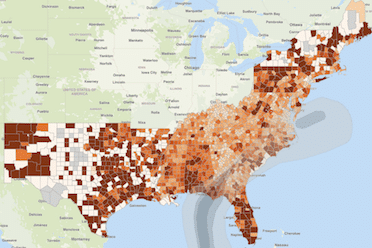
Energy Security Program
March 30, 2020
Rapid Hurricane Response Application
March 28, 2020The elected and appointed leaders in a community are responsible for ensuring that necessary and appropriate actions are taken to protect people and property from threats and hazards. During a crisis event or system shock, it is the government’s responsibility to marshal its resources, channel the efforts of the whole community, and, if necessary, solicit assistance from outside the jurisdiction. iParametrics was tasked with developing a crisis management plan and training for a large metropolitan county supporting over one million residents.
SITUATION
Planning for a crisis event must be community-based, representing the whole population and its needs with a focus on actions. These actions, taken by the local government during the initial phase of a crisis, include direction and control, warning, public notification, and evacuation. The key to Emergency and Crisis Planning is to develop a set of processes and procedures that are used as a guideline for emergency and crisis response. Pre-developed crisis management plans and associated activities enable community leaders to effectively address a worst-case or long-term crisis.
TASK
To assist the community in the prevention, management, and resolution of emergency and crisis situations, we were tasked with developing a community-wide Crisis Management and Response Plan. To support the plan, we were also tasked with creating in-person training for the Senior Leadership Team while providing a SCORM-compliant online course for over 6,000 employees to be deployed in the client's Learning Management System.
ACTION
Through several workshops with community leadership and staff, iParametrics performed a community-wide crisis management gap analysis using a variety of federal guidance (i.e. The National Incident Management System, The National Response Framework, etc.), best practices, and the Emergency Management Accreditation Program (EMAP) and standards. Scenario, Function, and Capabilities-based planning were then used to generate, compare, and select possible solutions for achieving the goals and objectives of the community during a crisis event. A Strategic Plan was developed to provide day-to-day, high-level context for crisis planning, and an Operational and Tactical Plan was developed to provide the specific steps responders would take during a crisis event. To support plan rollout, a series of training workshops were provided to more than 60 senior leaders within the client's operations. This training focused on key roles and actions these leaders would need to implement during a crisis. Concurrently, our team designed an online awareness level training for the client's employees to educate them on individual roles and responsibilities during a crisis event.
RESULT
In 2019, following the development of the plan, its rollout, and training, senior leaders and staff expressed that they felt better equipped to assume the roles required by a crisis event. In March of 2020, in response to the COVID-19 pandemic, the community mobilized the plan in support of pandemic mitigation and response activities. The operational plan, supporting annexes, and training allowed the community to quickly focus personnel, equipment, and resources to support incident response. The plans provided the details required to facilitate a successful, coordinated enterprise-wide response to the event.


